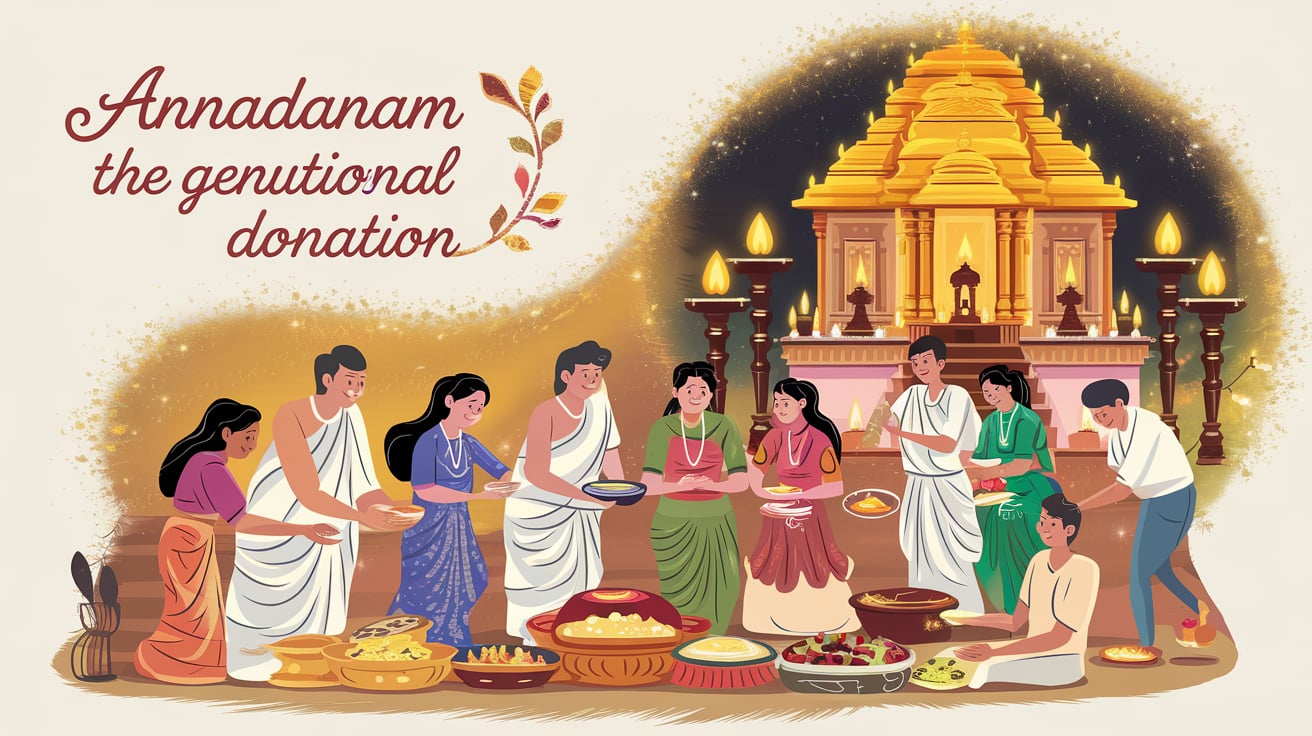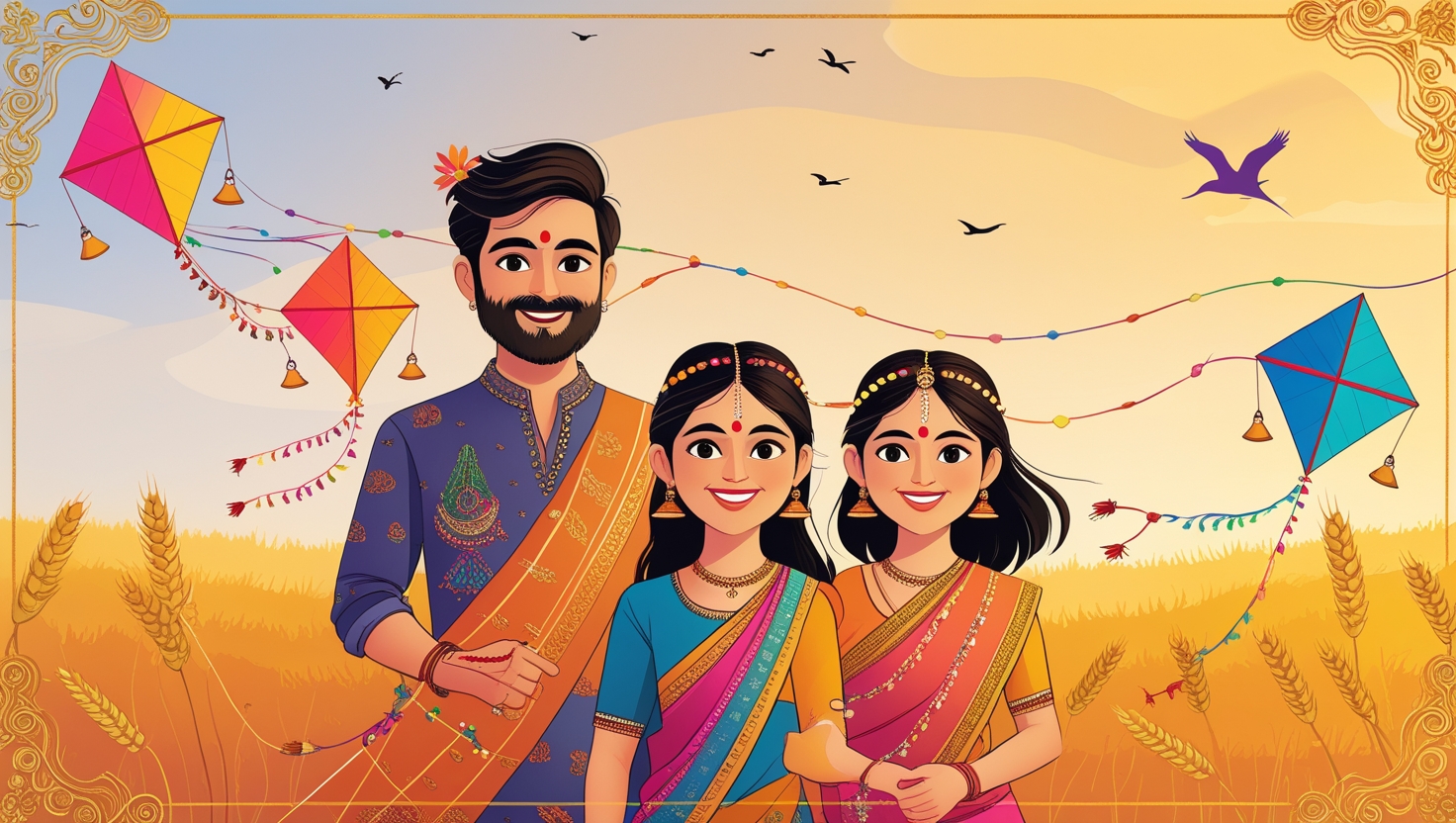अन्नदान – The Divine Act of Feeding Others
In the vast tapestry of Hindu traditions and spiritual practices, few acts of charity hold as much significance as Annadanam (अन्नदान). This traditional practice fuses act of feeding hungry people with deep religious importance to form a fundamental practice of Hindu dharma since ancient times. The sacred practice of Annadanam remains increasingly important during our current era of food scarcity because it combines ancient Hindu wisdom with present-day humanitarian requirements.
The Essence of Annadanam (अन्नदान का सार)
Annadanam combines the Sanskrit words Anna (अन्न) which means food with Danam (दान) which represents charitable donation into one term to express the spiritual bond formed during food distribution activities. According to Hindu belief Annadanam represents a transcendent spiritual link that establishes a higher connection between those who share food. On a fundamental level Annadanam reflects Hindu belief about food because it represents a divine gift that nourishes both spirit and physical body.
As the ancient scriptures declare:
अन्नदानं परं दानं विद्यादानमतः परम्।
अन्नेन क्षणिका तृप्तिः यावज्जीवं च विद्यया॥According to this important shloka both food donation stands as the ultimate charitable act but education gift proves superior to both of these elements. Food gives short-term pleasure yet education sustains individuals throughout all of life. The urgent need for food makes Annadanam especially worthy of merit because it fulfills one’s most essential requirement.
Historical Significance and Scriptural References (ऐतिहासिक महत्व और शास्त्रीय संदर्भ)
The practice of Annadanam gains deep importance in Indian history because numerous sacred scriptures recognize and encourage this practice. The Taittiriya Upanishad as an important Hindu text presents multiple instructions which explain both food principles and their meanings:
“अन्नं न निन्द्यात्” – Never disrespect food
We obtain sacred value from every portion of food through this essential ethical rule. This ancient guideline about food waste preservation finds new importance during the current period when massive food waste issues persist.
“अन्नं न परिचक्षीत” – Never neglect food
This commandment warns humans about their duty to stop food waste and make wise food distribution that means benefits all species.
“अन्नं बहु कुर्वीत” – Strive to produce abundant food
One must work diligently to create an abundance of food according to Vedic knowledge. This directive motivates people to generate and distribute food liberally while emphasizing its role in sustaining food resources and delivering security to populations.
The Chandogya Upanishad further elaborates on the spiritual significance of food:
“आहारशुद्धौ सतवशुद्धिः सत्त्वशुद्धौ ध्रुवा स्मृतिः” – Purity of food leads to purity of internal organs, which in turn leads to unfailing memory and spiritual evolution.
The Spiritual Dimensions of Annadanam (अन्नदान का आध्यात्मिक आयाम)

The practice of Annadanam is deeply intertwined with spiritual evolution in Hindu philosophy. The Mahabharata emphasizes this connection through the verse:
अन्नं ह्यमृतमित्याहुरन्नं प्रजननं स्मृतम्।
अन्नप्रणाशे सीदन्ति शरीरे पञ्च धातवः॥This powerful verse declares food as immortal and the source of life itself, stating that without food, the five elements constituting the body cannot sustain themselves. This understanding elevates the act of food donation from mere charity to a sacred duty that maintains the cosmic order.
The Matsya Purana further reinforces this concept with “अन्नं ब्रह्म” – declaring food as divine. This simple yet profound statement encapsulates the Hindu understanding of food as not just material sustenance but as a manifestation of the divine itself.
The Multiple Benefits of Annadanam (अन्नदान के विविध लाभ)
Spiritual Benefits:
- Purification of consciousness
- Accumulation of positive karma
- Divine blessings and grace
- Enhanced spiritual awareness
- Connection with the divine through service
Social Benefits:
- Strengthening community bonds
- Reducing social inequality
- Promoting compassion and empathy
- Creating a more harmonious society
- Building bridges across social divides
Personal Benefits:
- Development of generosity
- Cultivation of humility
- Growth in compassion
- Enhancement of personal character
- Joy of giving and serving others
Contemporary Relevance of Annadanam (वर्तमान समय में अन्नदान की प्रासंगिकता)
In our modern world, where hunger and malnutrition continue to affect millions, the practice of Annadanam has gained renewed importance. The ancient wisdom behind this practice offers valuable insights for addressing contemporary challenges:
Food Security: The principle of “अन्नं बहु कुर्वीत” (produce food in abundance) speaks directly to modern concerns about food security and sustainable agriculture.
Waste Reduction: The scriptural injunction against wasting food (“अन्नं न निन्द्यात्”) provides guidance for addressing the modern crisis of food waste.
Social Equality: Annadanam’s tradition of serving all, regardless of social status, offers a model for addressing social inequality and discrimination.
Community Building: The practice of communal feeding fosters social bonds and community resilience, crucial in our increasingly disconnected world.
Practical Aspects of Conducting Annadanam (अन्नदान करने की व्यावहारिक पद्धति)
To make Annadanam truly meaningful and effective, certain guidelines should be followed:
Preparation:
- Food should be prepared with pure intentions (शुद्ध भाव)
- Cleanliness and hygiene must be maintained
- Quality ingredients should be used
- Preparation should be done with devotion and care
- The environment should be peaceful and positive
Distribution:
- Food should be served with respect and love
- All recipients should be treated equally
- Proper arrangements for seating and serving
- Ensure adequate quantity for all
- Maintain dignity in distribution
Venues for Annadanam:
- Temples and Religious Institutions
- Schools and Educational Centers
- Orphanages and Children’s Homes
- Old Age Homes
- Disaster Relief Camps
- Community Centers
- Hospitals and Healthcare Facilities
Special Occasions for Annadanam (अन्नदान के विशेष अवसर)
While Annadanam can be performed any time, certain occasions are considered particularly auspicious:
- Religious Festivals
- Solar and Lunar Eclipses
- Birth Anniversaries
- Death Anniversaries
- Marriage Celebrations
- House Warming Ceremonies
- Religious Ceremonies and Rituals
Why Annadanam Surpasses Other Forms of Charity
The superiority of Annadanam over other forms of charity is explained through several key aspects:
- Immediate Impact: Unlike other forms of charity, food donation provides instant relief from hunger, addressing an immediate and vital need.
- Universal Applicability: Food is a basic need that transcends all barriers of religion, caste, creed, and social status.
- Dual Benefit: Annadanam benefits both the giver and receiver spiritually, creating a sacred bond between them.
- Preservation of Life: As stated in the scriptures, food is directly linked to the preservation of life force (पराण).
- Divine Connection: The act of feeding others is considered equivalent to serving the Divine, as food itself is considered a form of Brahman.
Modern Initiatives and Organizations
Today, numerous organizations and initiatives carry forward the tradition of Annadanam in organized and systematic ways:
- Community Kitchen Programs
- Food Banks and Distribution Centers
- Disaster Relief Operations
- Regular Temple Feeding Programs
- NGO-run Feeding Programs
- Corporate Social Responsibility Initiatives
- Government-sponsored Meal Programs
Conclusion
Annadanam represents one of the most profound expressions of human compassion and spiritual wisdom. In a world increasingly marked by division and inequality, this ancient practice offers a powerful means of fostering unity, compassion, and social harmony. As the scriptures remind us, the act of feeding others is not merely charity but a sacred duty that connects us with the divine and with our fellow beings.
The practice of Annadanam teaches us that true spirituality lies not in complex rituals or philosophical discourse, but in the simple act of sharing food with those in need. As we face contemporary challenges of hunger and food insecurity, the wisdom of Annadanam becomes increasingly relevant, offering both practical solutions and spiritual elevation.
Let us remember the profound truth expressed in the ancient texts: “जो अन्न देता है, वह प्राण देता है” – One who gives food gives life itself. In practicing Annadanam, we not only fulfill our dharma but also contribute to creating a more equitable and compassionate world.
May the ancient tradition of Annadanam continue to inspire generations, reminding us of our fundamental interconnectedness and our shared responsibility to care for one another. For in feeding others, we feed our own souls and move closer to the divine reality that underlies all existence.


